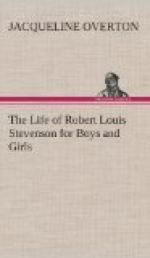“In these latter which made for years the chief of my diet, I very early fell in love (almost as soon as I could spell) with the Snob Papers. I knew them almost by heart ... and I remember my surprise when I found long afterward that they were famous, and signed with a famous name; to me, as I read and admired them, they were the works of Mr. Punch.”
Two old Bibles interested him particularly. They had belonged to his grandfather Stevenson and contained many marked passages and notes telling how they had been read aboard lighthouse tenders and on tours of inspection among the islands.
After he was thirteen his health was greatly improved and he was able to enjoy the comradeship of other lads, though he never cared greatly for sports. He was the leader of a number of boys who used to go about playing tricks on the neighbors—“tapping on their windows after nightfall, and all manner of wild freaks.”
“Crusoing” was a favorite game and its name stood for all picnicking in the open air, building bonfires and cooking apples, but the crowning sport of all was “Lantern Bearing,” a game invented by himself and shared by a dozen of his cronies.
“Toward the end of September,” he says, “when school time was drawing near and the nights were already black, we would begin to sally from our respective villas, each equipped with a tin bull’s-eye lantern.... We wore them buckled to the waist upon a cricket belt, and over them, such was the rigor of the game, a buttoned top-coat. They smelled noxiously of blistered tin; they never burned aright, though they would always burn our fingers; their use was naught; the pleasure of them merely fanciful; and yet a boy with a bull’s-eye under his top-coat asked for nothing more.
“When two of these asses met there would be an anxious, ’Have you your lantern?’ and a gratified ‘Yes,’ That was the shibboleth, and a very needful one too; for as it was the rule to keep our glory contained, none could recognize a lantern-bearer, unless like a polecat, by the smell.
“The essence of this bliss was to walk by yourself in the black night, the slide shut, the top-coat buttoned, not a ray escaping whether to conduct your footsteps or make your glory public, a mere pillar of darkness in the dark, and all the while, deep down in the privacy of your fool’s heart, to know you had a bull’s-eye at your belt and exult and sing over the knowledge.”
In later years one of the Lantern Bearers describes Louis as he was then. “A slender, long legged boy in pepper and salt tweeds, with an undescribable influence that forced us to include him in our play as a looker on, critic and slave driver.... No one had the remotest intention of competing with R.L.S. in story making, and his tales, had we known it, were such as the world would listen to in silence and wonder.”




